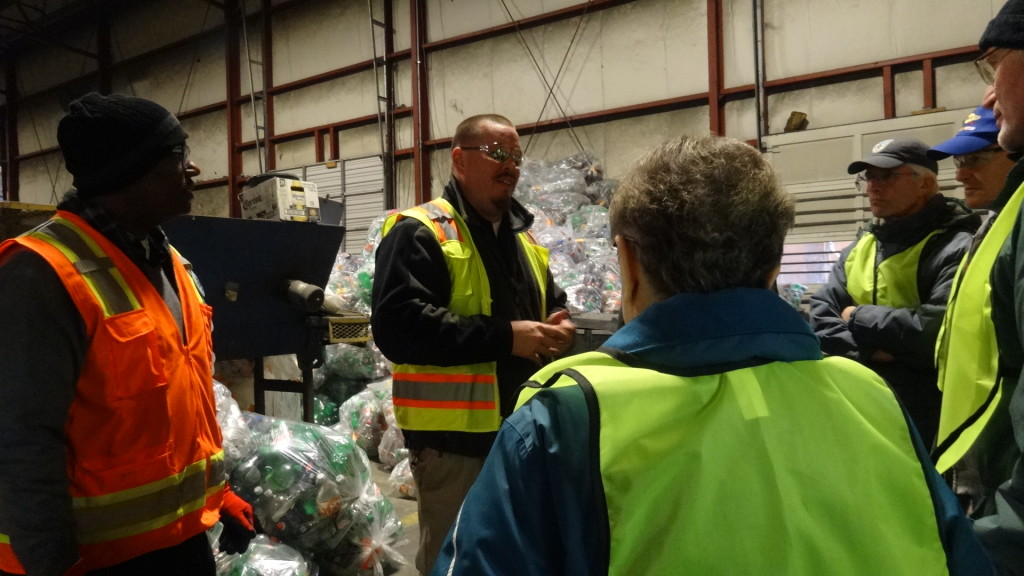Legislators gathered yesterday to tour the TOMRA recycling facility in Essex. They were given an inside look at beverage container recycling in Vermont, with presentations from TOMRA, the owner of Essex Discount Beverage owner, and the President of Quebec’s 2M Ressources – a company that buys recyclable material from Vermont.
After presentations about the redemption program, legislators donned safety vests and glasses and toured the recycling plant. TOMRA employs 20 Vermonters at its Essex location, which collects and sorts 90% of Vermont’s redeemed bottles. It was clear that recycling is big business in Vermont, and that business is good. And much of that success can be attributed to our state’s Bottle Bill.
Kevin Kittell, owner of Essex Discount Beverage, added: “As a small business owner who has been participating in the Bottle Bill for years…to do away with it would devastate my business and any other bottle redemption center in the state. It’s not a pretty business, but we’re effective at what we do. There’s a lot of people who count on that – part time jobs for kids, my livelihood, and the people who work for me. ”
Kevin has also found in his years in redemption that people who otherwise aren’t concerned with recycling will rigorously collect, sort, redeem, and in doing so, recycle Bottle Bill containers because of the cash incentive. Further, the high quality of Bottle Bill materials means it’s worth more after collection – and unlike some single-stream material, particularly glass – it can be remade into new containers and other products.
Michel Marquis from 2M Ressources purchases material from collection and sorting facilities like TOMRA. 2M processes 60,000 tons of Bottle Bill materials in their facility, a large part of which comes from Vermont. Michel compared the kind of redemption materials coming from a facility like TOMRA to single-stream materials, and spoke adamantly about the superior quality of Bottle Bill materials, particularly glass.
He argued that in many cases single-stream glass is too impure to truly reuse because it has been exposed to too many contaminants in its journey through a much broader, and messier, waste stream. Also breakage and handling problems cause glass shards to compromise other types of recyclables and to cause problems in the sorting process. Conversely, Bottle Bill glass is far cleaner, and meets the quality standards to be melted down and repurposed into more bottles and jars.
Regarding single-stream programs, Michel argued: “Is this recycling? This is not recycling. Recycling is taking the material: reuse, remelt, and make a new product. With the bottle bill material – I’m telling you, its 100% recyclable…The bottle bill is better because of the high quality of the product in the end. ”
All presenters agreed that single-stream recycling has its place in Vermont. And with the on-going implementation of Act 148 and its mandatory recycling and composting in the coming years, curbside and drop-off recycling will continue to grow across the state.
As local Chittenden Representative Linda Myers noted, “There’s perfectly good reason for the MRF [Materials Recovery Facility], but also perfectly good reasoning for bottle redemption. I don’t see, personally, why small businesses like Kevin’s [redemption center] should suffer because we have a major business like Casella trying to step up and claiming to be able to deal with all of it. It’s a benefit, in my opinion, for Vermont to have either/or, and two opportunities to continue recycling.”

